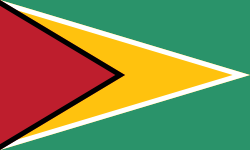This article needs additional citations for verification .(March 2016) |
Guyana | |||||||||
|---|---|---|---|---|---|---|---|---|---|
| 1966–1970 | |||||||||
| Motto: "One people, one nation, one destiny" | |||||||||
| Anthem: "Dear Land of Guyana, of Rivers and Plains" | |||||||||
 | |||||||||
| Capital | Georgetown | ||||||||
| Common languages | Official English Vernacular language Guyanese Creole | ||||||||
| Government | Unitary parliamentary constitutional monarchy | ||||||||
| Queen | |||||||||
• 1966–1970 | Elizabeth II | ||||||||
| Governor-General | |||||||||
• 1966 | Richard Luyt | ||||||||
• 1966–1969 | David Rose | ||||||||
• 1969–1970 | Edward Luckhoo | ||||||||
| Prime Minister | |||||||||
• 1966–1970 | Forbes Burnham | ||||||||
| History | |||||||||
• Independence | 26 May 1966 | ||||||||
• Republic | 23 February 1970 | ||||||||
| Currency | Guyanese dollar | ||||||||
| |||||||||
| Today part of | Guyana | ||||||||
Guyana was a predecessor to the modern-day Co-operative Republic of Guyana and an independent state that existed between 1966 and 1970.

